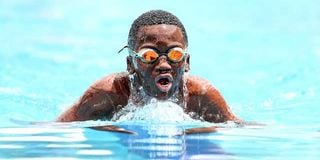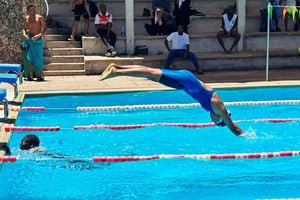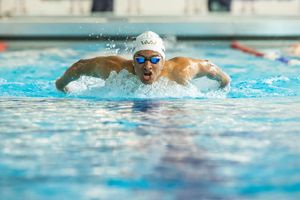
Andy Kadonde of Mombasa Aquatics swims during the NCSA Championship at Regis Academy in Nairobi on August 31, 2024.
Just when will the vicious swirl in the country’s murky swimming waters end?
Many stakeholders thought that the ping-pong and power struggles at Kenya Aquatics, formerly Kenya Swimming Federation (KSF), that had existed for over six years had ended after the much-awaited elections were held last year.
However, by the look of things, people can as well as tighten their belts and prepare for yet another roller-coaster of legal battles at the Sports Dispute Tribunal (SDT) and the High Court.
The swimming fraternity sighed with relief when World Aquatics lifted the ban on Kenya when the delayed elections were finally held on October 7, last year, with physician Maureen Owiti being elected the new KSF president.
World Aquatics, the Kenyan government, and the National Olympic Committee of Kenya (NOC-K) played crucial roles in their interventions that set the stage for the elections amidst pending court cases.
The lifting of the ban opened the doors for Kenyan swimmers to resume competing internationally, a development that saw the country field two swimmers-Maria Brunlehner and Ridhwan Abubakar- at the 2024 Paris Olympic Games.
World Aquatics, which had initially suspended KSF months earlier, moved to ban the country from its activities on August 15, last year after the KSF failed to hold elections as scheduled on July 7 of the same year.
That meant that Kenyan swimmers, who had been competing under the neural flag owing to the suspension, could not compete in any event around the world.
On August 27 this year, SDT nullified the elections that brought into office the new team led by Owiti over several anomalies including an existing case dating back to two years.
The appellant, Isaac Aluochier, had sought legal redress at the SDT because the elections were held when there was still an existing injunction order emanating from a previous case filed on March 18, 2021.
But in a new turn of events, Kenya Aquatics and the federation’s secretary general, Collins Marigiri, swiftly obtained a High Court order on September 18, this year stopping the ruling by SDT from coming into effect.
Aluochier, in his case at the SDT, charged that the elections were not compliant with mandatory provisions of Regulation 20 of the Sport’s Registrar’s Regulations 2016 and Section 46 (5) of the Sports Act.
SDT chairperson, John Ohaga, in a signed ruling in favour of Alouchier, indicated that the elections were invalid after they contravened the court’s order injunction dated March 19, 2021.
Ohaga’s group was unable to determine if the elections were not compliant with the Sports Act, but it was satisfied that the elections were not compliant with the mandatory provisions of the Sports Registrar’s Regulations, particularly 20(2) (a) and (d), 20(3), 20(4) and 20(5).
Regulation 20(2)(a) stipulates that national sports organisations must appoint an independent panel of at least five members to conduct the elections, while Regulation 20(2)(b) provides sports organisations to include observers from at least one umbrella sports organisation, the Ministry responsible for matters related to sports and the Registrar’s office.
Regulation 20(2)(d) provides that sports organisations must inform the Registrar four weeks before the expected date of elections, while Regulation 20(3) provides that an observer and the returning officer of the elections must submit a report to the Registrar on the credibility of the elections.
All these were not adhered to in the application by Alouchier, hence the move to stop the newly elected officials from taking office.
However, Justice Jairus Ngaah certified an application by Marigiri challenging the SDT ruling as urgent. He directed that a substantive motion be filed and served within seven days before the mention on October 7, 2024, for direction.
World Aquatics suspended Kenya Aquatics in December 2019, owing to repeated failure to comply with rules and decisions, and failure to hold elections.
World Aquatics was clear that normalcy would resume when a new office was in place, but allowed Kenyan swimmers to compete under a neutral flag.
Things went from bad to worse when World Aquatics disbanded Kenya Aquatics on June 28, 2022, accusing the local federation of encouraging swimmers to compete in events outside the country, yet it was still under suspension.
Instead, the World Aquatics established a three-man Stabilisation Committee headed by South Africa’s Jace Naidoo to run activities in the country and help KSF prepare for fresh elections.
The committee also had NOC-K Secretary General, Francis Mutuku, and Moses Benon Mwase from Uganda.
The Stabilisation Committee, which had been given six months, set June 24 last year as the date for a General Assembly, before the elective general assembly on July 8.
However, a court case instituted by Margaret Ndung’u Mwasha and Conrad Dermot Biltcliffe Thorpe at the High Court on March 19, 2021, challenging KSF, Sports Kenya, Sports Registrar, and Attorney General to court, for violating the constitution, halted everything.
They wanted the Sports Act interpreted after the universal voting where swimmers are allowed to vote was not applied in the Kenyan situation.
Naidoo insisted that elections must be held under World Aquatic Statutes, but Mwasha said that swimmers must have a say in elections and the running of the sport.
Sports Registrar Rose Wasike has also waded into the swimming wrangles, stating that World Aquatics and the Stabilisation Committee have no mandate to issue an election notice to her office.
Wasike, in a letter dated June 21, last year to the Stabilisation Committee, stated that World Aquatics erred in forming the Stabilisation Committee without the involvement of the Cabinet Secretary and the Principal Secretary for Sports.
After the push-and-pull, the Stabilisation Committee would then meet Former Sports Cabinet Secretary Ababu Nawamba to chat the way forward.
A consultative meeting between the World Aquatics Stabilisation Committee and stakeholders was held in September last year at the Moi International Sports Centre (MISC).
Despite the efforts by Namwamba, neither the court case petitioners nor World Aquatics were ready to cede the ground with the government also seeming hostage of the Sports Act.
But elections still went on paving the way for the lifting of the ban. Since 2013, under the leadership of Ben Ekumbo, the KSF has been characterised by incessant wrangles, denying talented youth opportunities to advance their careers.
Not even a change in leadership at the federation in 2016, when Ekumbo resigned as KSF president under a dark cloud of the 2016 Olympics Team Kenya kits scandal, put an end to the wrangles.
The wrangles continued under the late Patrick Muyah’s leadership. Muyah passed on in April 2021 as Zack Musembi took charge in an acting capacity.
The federation’s elections had been postponed twice in two years, prompting Fina to suspend KSF in December 2019 until a new office is in place.
In March 2021, FINA approved KSF’s new constitution, paving the way for the federation to conduct long-overdue elections.
The interim management committee headed by Sanjeev Khagram was put in place by the Sports Dispute Tribunal to prepare the road map for elections but it failed.







